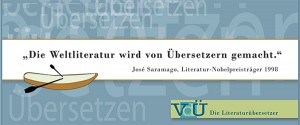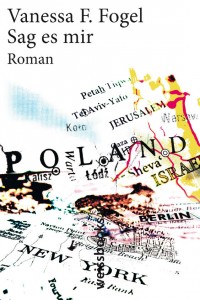On Behind-the-scenes Labor in the Cultural Economy

“Translators create universal literature.” José Saramago, Nobel Prize Winner for Literature 1998
© VdÜ (Germany’s Union of Literary Translators), design: Christian Hoffmann
Today is Giornata mondiale della traduzione, Międzynarodowy Dzień Tłumacza, Journée mondiale de la traduction, Uluslararası Çeviri Günü or Día Internacional de la Traducción—which is to say, International Translation Day, an occasion established in 1991 by the Fédération Internationale des Traducteurs (FIT: International Federation of Translators) in order to raise public awareness of the cultural impact of the wordsmith’s trade. 30 September is the anniversary of the death in 420 CE of Hieronymus, who translated the Hebrew Bible into Latin. Since ancient times translation has influenced the target language in question, and in the globally networked world of today it is our constant companion. Germany’s Union of Literary Translators (VdÜ) puts it in a nutshell: “Wherever words have been spoken, written, read, or even sung, translators have had a finger in the pie, and indeed they still do; and it is thanks to them that the whole world is at home in its own language.” → continue reading
or “Being who I am”
“The night before I fly to Germany to see my grandfather Mosha, I meet someone, take him home with me, and for the first time in my life, I sleep with a man.”

© weissbooks.w
Frankfurt am Main
This sentence begins the first chapter of the 2010 novel Sag es mir (Tell it to me) by Vanessa F. Fogel. The author was born in 1981 in Frankfurt and grew up in Israel. She introduces the first-person narrator of this autobiographical novel both as a granddaughter and as a confident young woman right from the start. And despite her imminent trip to the sites of extermination – she meets her grandfather in Berlin and they travel together to Poland – her emphasis is on vitality and the joys of living.
The Frankfurt publishing house weissbooks has now taken on another Jewish writer of “the third generation.” Channah Trzebiner is a lawyer, also born in 1981 in Frankfurt, where, unlike Fogel, she still lives. She has written Die Enkelin (The Granddaughter), which is more of “a kind of inner monologue” than a novel. This book also begins confidently: “I accept the woman that I am.” At once, however, the author alerts her reader to the difficult process underlying this claim:
“For years I cut off my connection to the innermost ‘I’ […], so that I could be the substitute for a life ended by murder. How I could have done otherwise? I’m called Channah after my grandmother’s youngest sister […].”
→ continue reading
From the In-Box of the Blog Editorial
Luckily, this blog receives anti-Semitic comments only rarely. When the case arises, we, the moderators, ask ourselves – as we do with all comments – whether we should publish them and make them visible for others, or not? Should we post this type of aggressive nonsense for the sake of transparency and documentation, and reveal the statements a Jewish museum has to deal with? Should we perhaps even reply to them and invalidate the commentator’s ‘arguments,’ if he or she has any? Or would we be offering anti-Semites an unwarranted platform? So far, we have opted against publishing the type of comment which reproduces age-old theories of world conspiracy. Such delusions are far too widely proliferated already, and we neither want to spread them further nor compel our readers to take them seriously on the Jewish Museum’s blog.

Blog editor at work
Much more often, the blog’s inbox contains a chorus of praise: “Thanks for the wise analysis,” one reader tells us, or, an even more enthusiastic writer: “Super-Duper website! I am loving it!! Will come back again.”
Some are positively ecstatic: → continue reading


